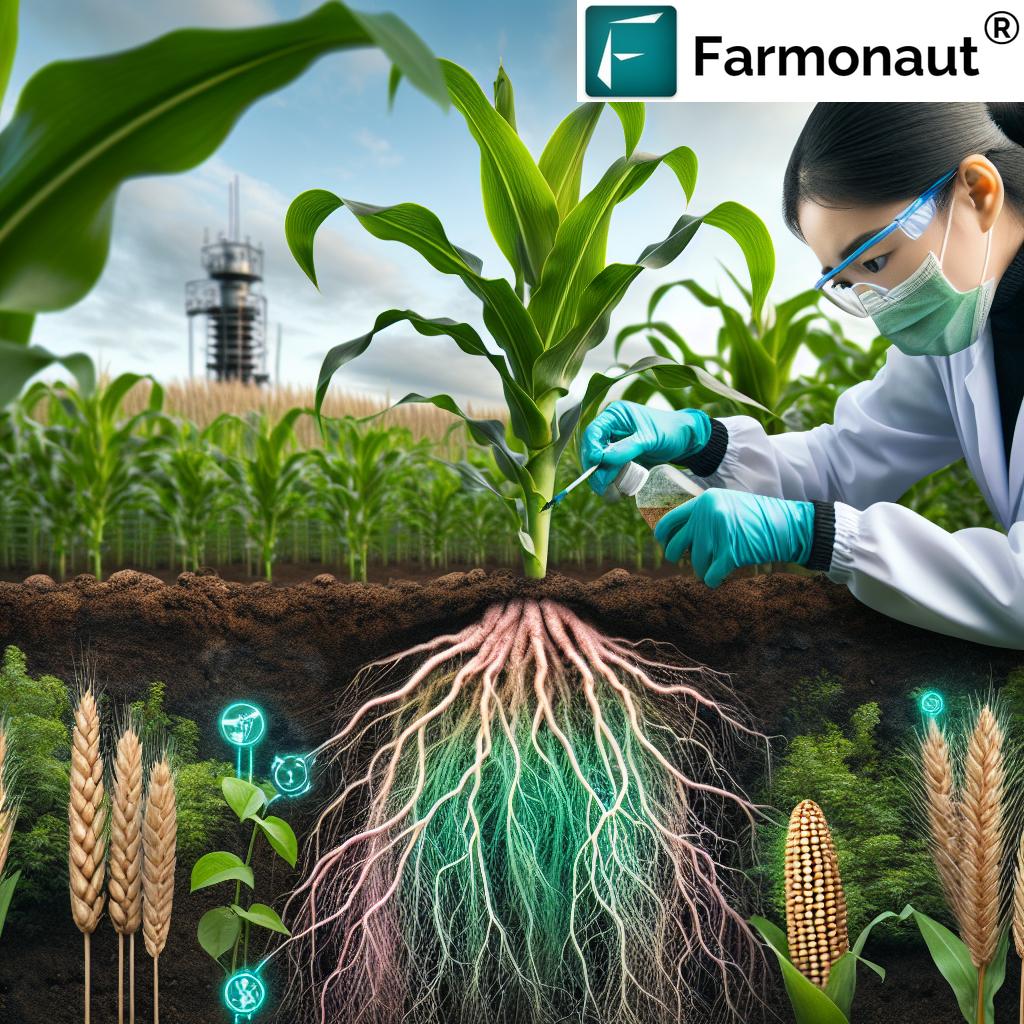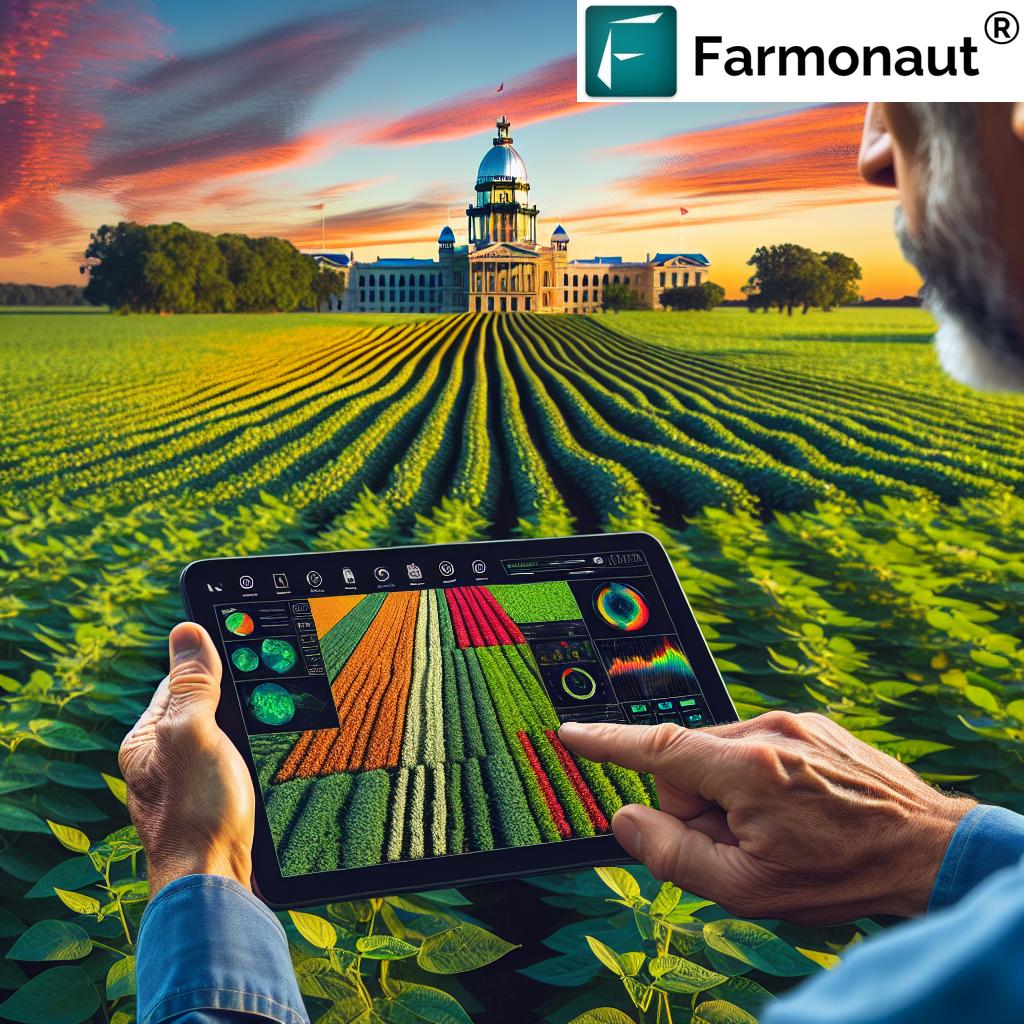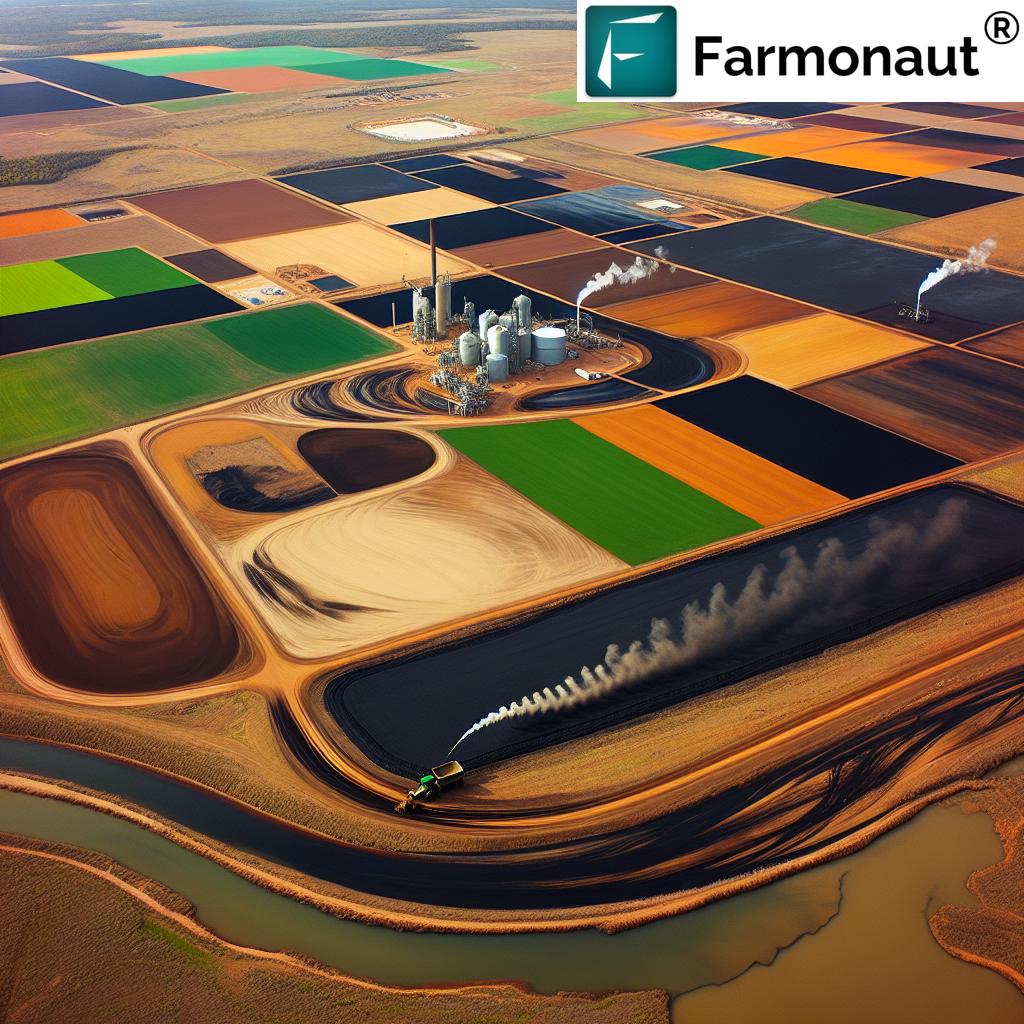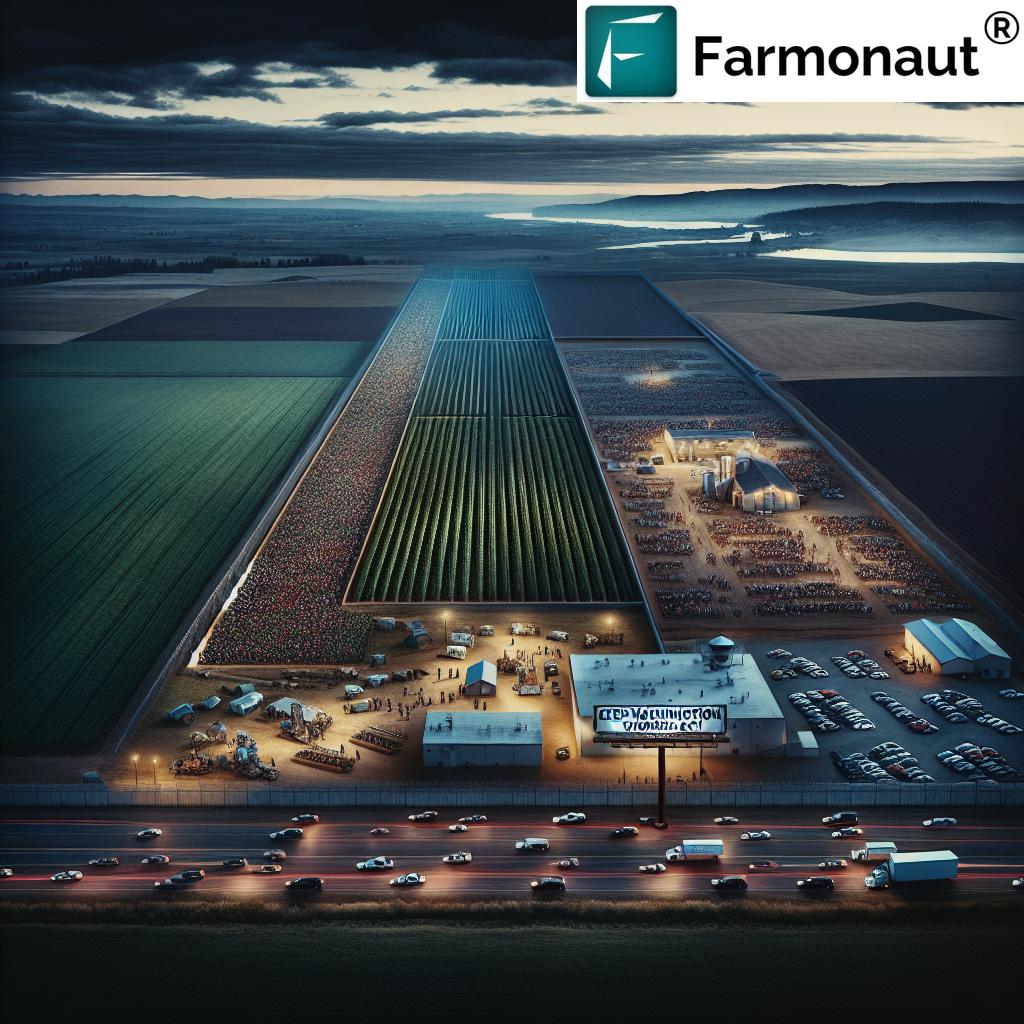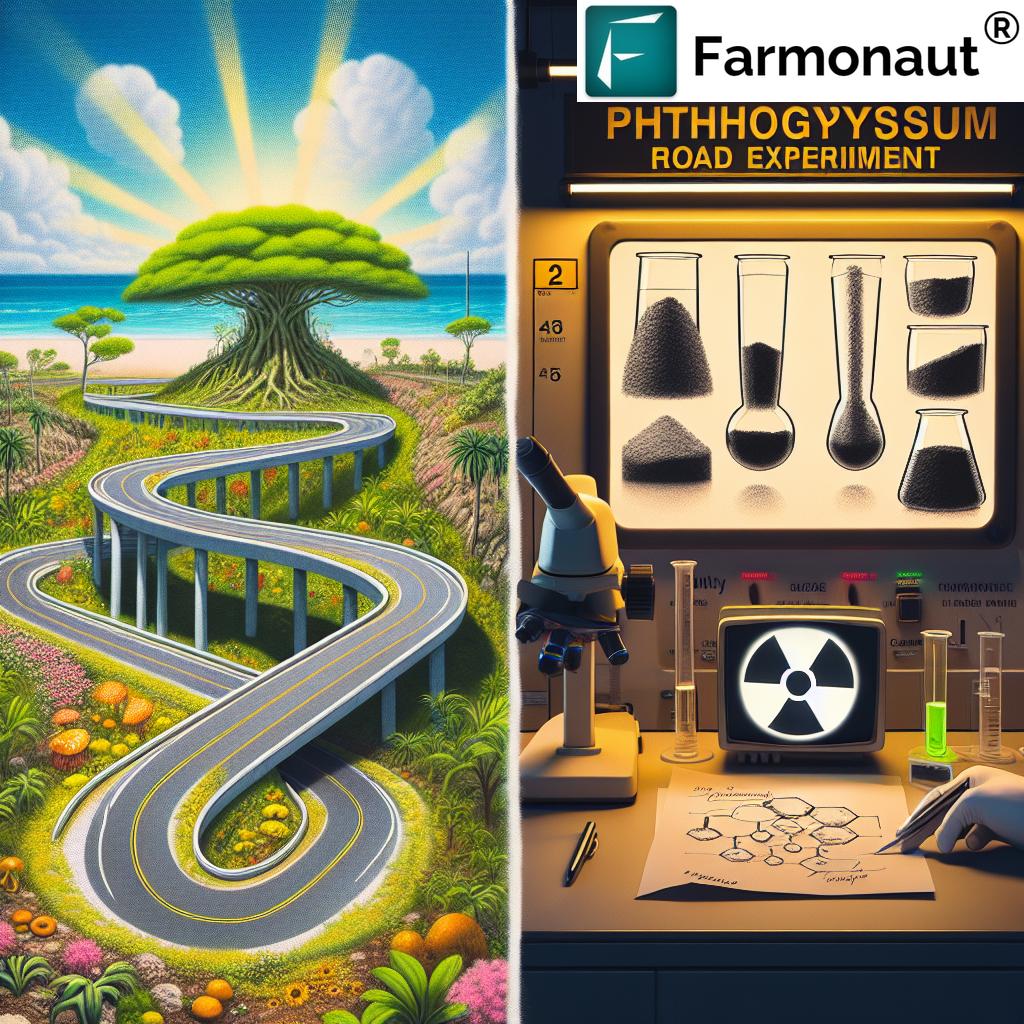Revolutionizing California Agriculture: Farmonaut’s Precision Farming Technology for Sustainable Crop Management
“Over 50% of agriculture graduates find jobs in business, science, engineering, and communication sectors.”
Welcome to our comprehensive 2024 Undergraduate Agricultural College Guide, where we explore the future of agricultural education and career opportunities. As we delve into the world of precision agriculture and sustainable farming practices, we’ll discover how innovative companies like Farmonaut are reshaping the landscape of California agriculture and beyond.
The Evolution of Agricultural Education
In recent years, we’ve witnessed a remarkable transformation in agricultural education. Today’s agriculture degree programs are no longer limited to traditional farming techniques. Instead, they encompass a wide range of disciplines, including agribusiness, environmental sciences, and cutting-edge agricultural technology.
As we explore the top agriculture colleges across the United States, we’ll uncover the diverse opportunities available to students passionate about shaping the future of food production and environmental stewardship.
Top Agriculture Degree Programs: A Comparative Overview
| University Name | Location (State) | Degree Programs Offered | Estimated Annual Tuition (In-state/Out-of-state) | On-campus Farming Opportunities | Precision Agriculture Technology Focus | Job Placement Rate (%) |
|---|---|---|---|---|---|---|
| University of California, Davis | California | Agribusiness, Sustainable Agriculture | $14,500 / $44,000 | Yes | High | 95 |
| Cornell University | New York | Agricultural Sciences, Food Science | $59,000 / $59,000 | Yes | High | 97 |
| Iowa State University | Iowa | Agronomy, Agricultural Engineering | $9,300 / $24,500 | Yes | High | 93 |
| Texas A&M University | Texas | Animal Science, Plant Biotechnology | $11,000 / $37,500 | Yes | Medium | 92 |
| Purdue University | Indiana | Agricultural Economics, Horticulture | $10,000 / $29,000 | Yes | High | 94 |
| University of Florida | Florida | Environmental Management, Entomology | $6,400 / $28,600 | Yes | Medium | 91 |
| Michigan State University | Michigan | Crop and Soil Sciences, Forestry | $14,500 / $40,000 | Yes | High | 90 |
| University of Wisconsin-Madison | Wisconsin | Dairy Science, Agroecology | $10,700 / $37,800 | Yes | Medium | 93 |
| North Carolina State University | North Carolina | Poultry Science, Agricultural Business Management | $9,100 / $29,200 | Yes | High | 92 |
| University of Illinois at Urbana-Champaign | Illinois | Crop Sciences, Agricultural Leadership | $15,100 / $32,600 | Yes | High | 95 |
This table provides a snapshot of some of the leading agriculture programs in the United States. As we can see, these institutions offer a wide range of specializations, from traditional agricultural sciences to cutting-edge fields like precision agriculture and sustainable farming practices.
The Rise of Precision Agriculture Technology
One of the most exciting developments in modern agriculture is the integration of precision farming technologies. Companies like Farmonaut are at the forefront of this revolution, offering innovative solutions that combine satellite imagery, artificial intelligence, and data analytics to optimize crop management and resource utilization.
Farmonaut’s Satellite-Based Farm Management Solutions
Farmonaut has developed a comprehensive platform that leverages advanced technologies to provide farmers with valuable insights and tools for sustainable crop management. Let’s explore some of the key features:
- Real-time crop health monitoring using multispectral satellite imagery
- AI-powered advisory systems for personalized farm management
- Blockchain-based traceability for enhanced supply chain transparency
- Resource management tools for optimizing water usage and fertilizer application
These cutting-edge solutions are accessible through Farmonaut’s web application, mobile apps for Android and iOS, and even via their API for seamless integration with existing farm management systems.

The Impact of Precision Farming on California Agriculture
California, known for its diverse and productive agricultural sector, is experiencing a significant transformation through the adoption of precision farming technologies. Farmonaut’s solutions are particularly well-suited to address the unique challenges faced by California farmers, including water scarcity and the need for sustainable practices.
By utilizing Farmonaut’s satellite-based crop health monitoring and AI-driven advisory systems, California farmers can:
- Optimize irrigation schedules based on real-time soil moisture data
- Detect early signs of pest infestations or nutrient deficiencies
- Reduce water waste and improve overall resource efficiency
- Implement targeted fertilizer applications, minimizing environmental impact
These advancements not only improve crop yields and quality but also contribute to the long-term sustainability of California’s agricultural industry.
Sustainable Farming Practices: A Core Focus in Agricultural Education
As we explore the top agriculture degree programs across the United States, it’s evident that sustainable farming practices have become a central theme in agricultural education. This shift reflects the growing awareness of environmental challenges and the need for responsible resource management in agriculture.
Students pursuing agriculture degrees today are exposed to a wide range of sustainable farming techniques, including:
- Conservation tillage and soil health management
- Integrated pest management strategies
- Precision irrigation systems and water conservation methods
- Organic farming principles and certification processes
- Agroforestry and sustainable landscape design
These educational programs are preparing the next generation of agricultural professionals to tackle the complex challenges of food security, climate change, and environmental conservation.
“The 2024 Undergraduate Agricultural College Guide covers more than 100 top agriculture degree programs across the U.S.”
The Role of Technology in Modern Agricultural Education
As precision agriculture technology continues to evolve, agricultural colleges are integrating these advancements into their curricula. Students now have access to state-of-the-art facilities and hands-on experience with the latest farming technologies, including:
- Drone-based crop monitoring and mapping
- GPS-guided machinery and autonomous farming equipment
- Data analytics and machine learning applications in agriculture
- Remote sensing technologies for soil and crop analysis
This exposure to cutting-edge technology ensures that graduates are well-prepared to enter the workforce and contribute to the ongoing innovation in the agricultural sector.
Farmonaut’s Contribution to Agricultural Education and Research
Farmonaut’s advanced precision farming platform not only benefits commercial farmers but also plays a crucial role in agricultural education and research. The company’s API Developer Docs provide valuable resources for students and researchers looking to explore the possibilities of satellite-based farm management and data analytics in agriculture.
By partnering with agricultural institutions, Farmonaut facilitates:
- Access to real-time satellite imagery and crop health data for research projects
- Opportunities for students to work with industry-leading precision farming tools
- Collaboration on developing new algorithms and models for crop yield prediction
- Integration of blockchain technology in agricultural supply chain studies
These partnerships create a bridge between academic knowledge and practical application, preparing students for the evolving demands of the agricultural industry.
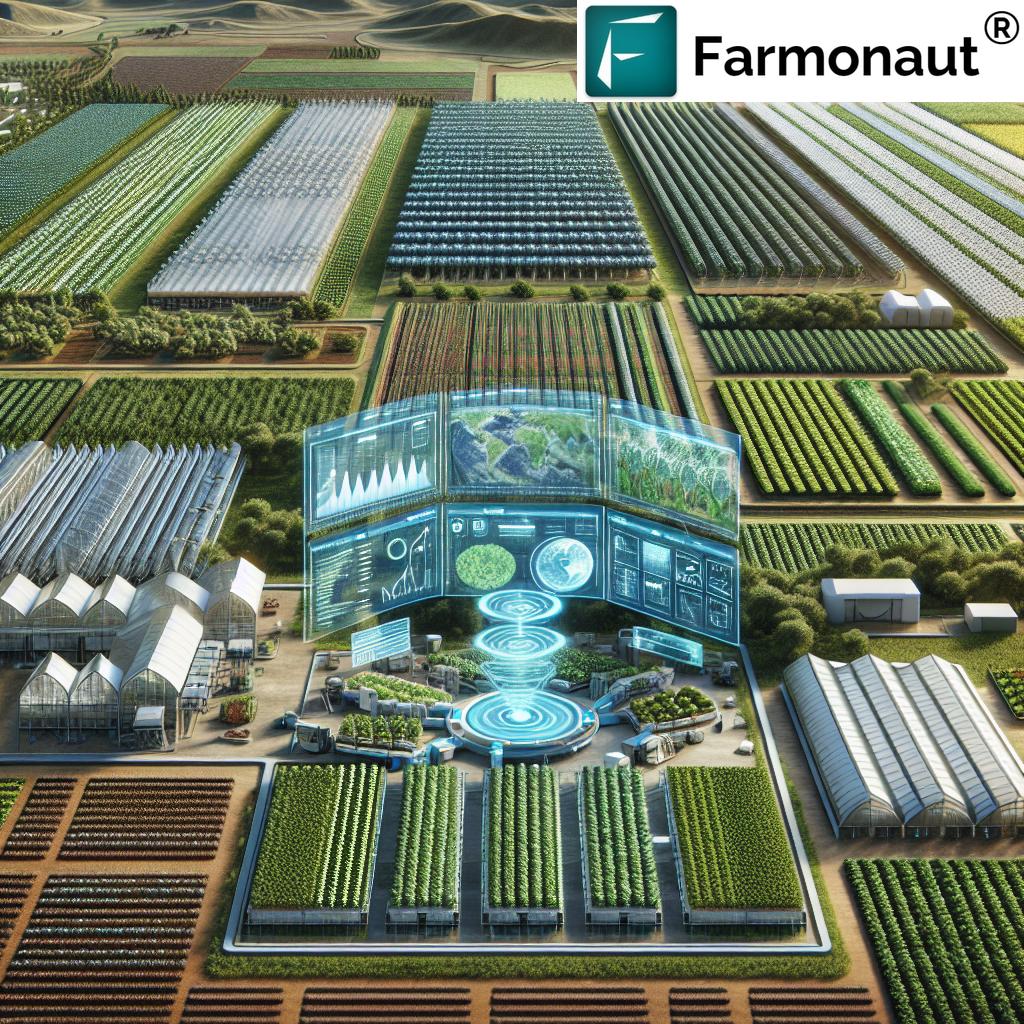
Career Opportunities in Agriculture: Beyond Traditional Farming
One of the most exciting aspects of pursuing an agriculture degree in 2024 is the diverse range of career opportunities available to graduates. The integration of technology, business, and environmental sciences into agricultural education has opened up new pathways for professionals in this field.
Some of the emerging career opportunities for agriculture graduates include:
- Precision Agriculture Specialist
- Agricultural Data Analyst
- Sustainable Farm Manager
- Agribusiness Consultant
- Food Safety and Quality Assurance Manager
- Agricultural Policy Advisor
- Agri-tech Entrepreneur
These roles span various sectors, including business, science, engineering, and communication, reflecting the interdisciplinary nature of modern agriculture.
The Future of Agriculture: Trends and Innovations
As we look towards the future of agriculture, several trends and innovations are shaping the industry:
- Vertical Farming and Urban Agriculture: With growing urbanization, vertical farming technologies are gaining traction, allowing for efficient food production in urban environments.
- Gene Editing and Crop Resilience: Advancements in genomics and biotechnology are paving the way for more resilient and nutritious crop varieties.
- Artificial Intelligence in Farm Management: AI-powered systems, like Farmonaut’s Jeevn AI, are revolutionizing decision-making processes in agriculture.
- Blockchain for Food Traceability: Blockchain technology is enhancing transparency and trust in agricultural supply chains.
- Renewable Energy Integration: The adoption of solar and wind energy in farming operations is reducing the carbon footprint of agriculture.
These trends highlight the importance of interdisciplinary education in preparing future agricultural professionals to tackle complex global challenges.
Choosing the Right Agriculture Program: Factors to Consider
For prospective students exploring agriculture degree programs, several factors should be considered:
- Specialization options and alignment with career goals
- Research opportunities and facilities
- Industry partnerships and internship programs
- Access to advanced technologies and precision farming tools
- Sustainability focus and environmental stewardship programs
- Job placement rates and alumni network
By carefully evaluating these factors, students can select a program that best prepares them for a successful career in the dynamic field of agriculture.
The Role of Precision Agriculture in Addressing Global Challenges
As we face global challenges such as climate change, food security, and resource scarcity, precision agriculture technologies play a crucial role in developing sustainable solutions. Companies like Farmonaut are at the forefront of this effort, providing tools that enable farmers to:
- Maximize crop yields while minimizing environmental impact
- Adapt to changing climate conditions through data-driven decision-making
- Reduce water usage and improve overall resource efficiency
- Implement targeted pest management strategies, reducing reliance on chemical pesticides
By integrating these advanced technologies into agricultural practices, we can work towards a more sustainable and resilient food production system.
Farmonaut’s Subscription Plans: Accessible Precision Farming for All
To make precision agriculture technology accessible to farmers of all scales, Farmonaut offers flexible subscription plans tailored to different needs and farm sizes. These plans provide access to the company’s suite of tools, including satellite-based crop monitoring, AI advisory systems, and resource management features.
FAQs: Agriculture Education and Precision Farming
Q: What is precision agriculture, and how does it benefit farmers?
A: Precision agriculture is a farming management concept that uses technology to optimize crop yields and resource use. It benefits farmers by providing data-driven insights for decision-making, reducing waste, and improving overall farm efficiency.
Q: How are agricultural colleges incorporating precision farming technologies into their curricula?
A: Many agricultural colleges now offer courses and hands-on experiences with precision farming tools, including GPS-guided equipment, drone technology, and data analytics software. Some programs also partner with companies like Farmonaut to provide students with access to real-world precision agriculture platforms.
Q: What career opportunities are available for graduates with expertise in precision agriculture?
A: Graduates can pursue careers as precision agriculture specialists, farm managers, agricultural data analysts, agtech consultants, or even start their own agtech companies. The demand for professionals with expertise in this field is growing across various sectors of the agricultural industry.
Q: How does Farmonaut’s technology contribute to sustainable farming practices?
A: Farmonaut’s satellite-based monitoring and AI advisory systems help farmers optimize resource use, reduce chemical inputs, and implement targeted crop management strategies. This leads to more sustainable farming practices that minimize environmental impact while maintaining or improving crop yields.
Q: What should I look for when choosing an agriculture degree program?
A: Consider factors such as the program’s specialization options, research opportunities, access to advanced technologies, industry partnerships, and job placement rates. Look for programs that offer a balance of theoretical knowledge and practical, hands-on experience with modern agricultural technologies.
Conclusion: Embracing the Future of Agriculture
As we’ve explored in this comprehensive guide, the field of agriculture is undergoing a remarkable transformation driven by technological innovation and a growing focus on sustainability. The integration of precision farming technologies, exemplified by companies like Farmonaut, is revolutionizing crop management practices and opening up new possibilities for efficient and sustainable food production.
For students considering a career in agriculture, the future is bright and full of opportunities. By choosing a degree program that emphasizes both traditional agricultural knowledge and cutting-edge technologies, you’ll be well-prepared to tackle the complex challenges facing the industry and contribute to a more sustainable future for global food systems.
Whether you’re interested in becoming a precision agriculture specialist, an agribusiness leader, or an agricultural researcher, the skills and knowledge gained from today’s top agriculture programs will set you on a path to success in this dynamic and essential field.
As we continue to innovate and adapt to changing environmental and economic conditions, the role of agriculture in shaping our world has never been more critical. By embracing the power of technology and sustainable practices, we can work together to create a more resilient, efficient, and environmentally friendly agricultural sector that meets the needs of a growing global population.
To learn more about how you can get started with precision agriculture technology, explore Farmonaut’s solutions:
Together, we can revolutionize agriculture and build a more sustainable future for generations to come.









